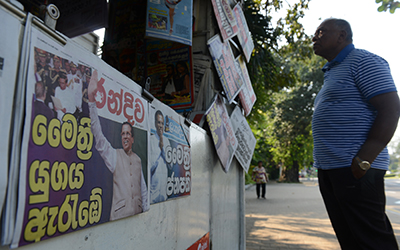The stunning defeat of Sri Lanka’s incumbent president Mahinda Rajapaksa by challenger Maithripala Sirisena on Friday has given way to questions about what changes, if any, will come for press freedom in a country that had grown deeply repressive under the previous leadership.
Sirisena’s candidacy was backed by many local media advocates and freedom of expression groups, including the Free Media Movement, but commentators have advised that any jubilation over his victory should be tempered. While Sirisena has pledged to tackle corruption and ensure greater transparency, he draws his support from many of the same actors as the previous government. “Sirisena has promised to abolish the strong presidency introduced by Mr. Rajapaksa and return the country to a parliamentary system, but the coalition around him is a sprawling, diverse one, including Buddhist nationalists, Marxists and center-right politicians, among others,” wrote journalists Ellen Barry and Dharisha Bastians in The New York Times after the win, which Barry described as “a jaw-dropper.”
And Indian journalist Samanth Subramanian, writing in The New Yorker, said, “Like Rajapaksa, Sirisena ardently courts the Buddhist right, and he has said that he won’t diminish the strength or the influence of the Army.”
Sri Lanka had fostered an increasingly repressive press environment. The country has a high record of impunity when it comes to journalist killings, and Rajapaksa repeatedly censored the press during his decade in power, during which he oversaw the end of the civil war. In the lead up to the vote last week, there were several reports of violence against journalists covering and participating in events. The election also came as the anniversaries of the death of Lasantha Wickramatunga, a journalist killed six years ago, and Prageeth Eknelygoda, a political cartoonist who went missing five years ago, were marked.
But there is reason to hope that the climate for press freedom will improve. The new government has said it will immediately restore access to several news websites that had been previously blocked for their coverage of politics and dissent, including those of the Colombo Telegraph and the exile-run TamilNet. It also announced an end to surveillance in the country, according to news reports.
“Sirisena’s victory was something those in the independent media hoped and prayed for but didn’t quite believe would really happen because, according to all indications, the election was never going to be free or fair,” Sri Lankan journalist Hana Ibrahim told CPJ. “It is hoped the victory will indeed usher in that change, restoring democracy, rule of law, good governance, put an end to crony politics, end corruption and restore media freedom, the latter which [Sirisena] promised in his 100-day programme.”
According to the program, which was part of Sirisena’s election manifesto, the new government plans to take measures to “safeguard the independence of media personnel and institutions” and strengthen the right to freedom of thought and expression.
“This promise was reiterated when we–members of several media organizations–met him to hand over a set of short proposals with regard to ensuring a free and independent media,” she told CPJ.
But whether Sirisena will take concrete action to follow his verbal commitments remains to be seen.
If the new leadership truly aspires to foster a healthier climate for press freedom it must take serious steps to address the culture of impunity in anti-press violence that has flourished in the past decade. Sri Lanka ranks fourth in the world on CPJ’s 2014 Impunity Index, which spotlights countries where journalists are frequently murdered and the killers remain free. CPJ research shows that many of those killed in Sri Lanka had reported on politically sensitive matters and were critical of the government. The island nation also ranks among the top countries from where journalists flee, according to data compiled by CPJ.
Among those murdered was Wickramatunga, editor-in-chief of the weekly The Sunday Leader. No one has yet been brought to justice for the killing, six years ago this month. In an open letter to Rajapaksa on the eve of elections, that his widow Sonali Samarasinghe shared with CPJ, she wrote, “At no time in the history of our country has the freedom of expression so brutally been repressed as it is now. Such media as do operate in the country, have been transformed either into propaganda mouthpieces for you and your brothers, or bullied into submission. The Lasantha Wickrematunge [sic] assassination was the last nail in the coffin of Sri Lanka’s media freedom. You owe it to the people of Sri Lanka to properly investigate not only Lasantha’s death, but also the deaths of other journalists and activists.”
While Rajapaksa showed no political will to address Sri Lanka’s record of complete impunity in the nine murders of journalists that have taken place under his leadership, Sirisena now has the opportunity to turn over a new leaf by bringing perpetrators to account.
As world leaders express solidarity in the wake of the attack on the satirical weekly magazine Charlie Hebdo in France on January 7, which killed 12 people including eight journalists, Sirisena can show his solidarity by ensuring transparency and justice in the case of missing cartoonist and Lanka eNews columnist Eknelygoda, who disappeared five years ago this month.
